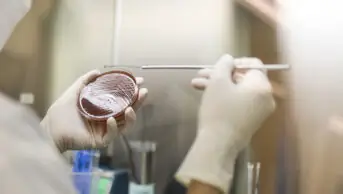
Courtesy, NICE
Healthcare professionals should question their colleagues’ prescribing of antimicrobials when they don’t comply with local or national guidelines, according to Mark Baker, director of the clinical centre for practice at the National Institute for Health and Care Excellence (NICE).
Baker also suggested that doctors should be reported to the General Medical Council, the doctors’ regulator, if their performance was consistently substandard.
NICE has launched a new guideline on antimicrobial stewardship that aims to reduce the number of prescriptions for antibiotics. In 2013–2014, there were 41.6 million prescriptions for antibiotics. If NICE guidance launched in 2007 had been followed, there would have been 10 million fewer prescriptions for antibiotics in 2014, a NICE spokesperson said. According to NICE, the main source of unnecessary prescribing is for respiratory tract infections.
The Royal College of GPs (RCGP) objects to NICE’s comments. Tim Ballard, vice chair of RCGP, says any suggestion that GPs should be reported to the regulator for overprescribing antibiotics is “counterproductive and unhelpful”.
He explains that GPs can be put under enormous pressure to prescribe antibiotics by patients. “People must realise that this is dangerous for each and every one of us, not just ‘other people’,” he adds.
Nine out of ten GPs feel pressured to prescribe antibiotics and 97% of patients who ask for an antibiotic will be prescribed one, research shows. Baker said many members of the public misunderstand the concept of resistance, and believe it is their body that becomes resistant to antibiotics and not the bacteria.
The NICE guideline recommends that prescribers explain the risks of antimicrobial resistance to patients. In addition, community pharmacists can help by explaining to patients the dangers of taking antibiotics inappropriately or of not taking them as prescribed, says a NICE spokesperson.
NICE has recommended a process of ‘peer-review’ within GP practices, so that colleagues can examine who is prescribing what and why. In addition, antimicrobial stewardship teams should be established in all NHS organisations, including hospitals and clinical commissioning groups. The guideline places antimicrobial pharmacists at the core of these teams, which are tasked with monitoring antibiotic prescribing and providing feedback to prescribers. According to a NICE spokesperson, in theory any member of these teams could refer a doctor to the GMC if they regularly overprescribe antibiotics but this would be a “last resort”.
Ash Soni, president of the Royal Pharmaceutical Society, says: “Better stewardship of antibiotics has a vital role to play in reducing unnecessary antibiotic use. All prescribers need to be vigilant and ensure all treatment options have been considered before antibiotics are prescribed.”
Soni says the vast majority of antibiotics are prescribed outside of hospitals, usually by GPs. “What’s also required to meet the antibiotic challenge is increased support for GPs and patients from other community healthcare professionals so we are all taking the same approach to prevent antibiotic overuse,” he adds.
Other NICE recommendations make it clear that antibiotics should not be prescribed for conditions that are likely to be self-limiting. Alternatives to antibiotic prescribing are recommended, including watchful waiting and delayed prescriptions, such as in the case of uncomplicated urinary tract infections.
In addition, NICE recommends considering point-of-care testing to distinguish between viral and bacterial respiratory infections before prescribing antibiotics and suggests that a randomised control trial is carried out to evaluate the impact this has on prescribing behaviour.
To coincide with the launch of the guideline, NHS England has issued a national patient safety alert to NHS organisations, highlighting the challenge of antimicrobial resistance.


